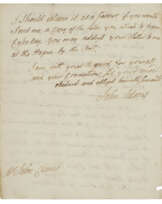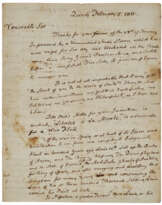ID 1119229
Lot 97 | John Adams's own, signed copy
Estimate value
$ 10 000 – 15 000
David Hume, 1763
[ADAMS, John (1735-1826).] HUME, David (1711-1776). The History of England. From the Invasion of Julius Caesar to the Revolution in 1688. Vol. VI. London: A Millar, 1763.
From the President's personal set of David Hume's history of England. Signed ("John Adams") on the title-page.
This volume covers the period 1613 to 1643, and focusing on the reign of James I and Charles I including discussions of Sir Walter Raleigh's expedition (and his execution) the fall of Francis Bacon and of course, the Stuart's growing conflicts with Parliament and the eruption of the English Civil war. Adams was an avid reader of Hume, although he didn't always agree with his conclusions, which can be seen in Adams's references to the Scottish philosopher in his published writings. In his 1776 tract, "Thoughts on Government," Adams wrote: "Americans in this age are too enlightened out of their liberties, even by such mighty names as Locke, Milton, Turgot, or Hume; they know that popular elections of one essential branch of the legislature, frequently repeated, are the only possible means of forming a free constitution…. Upon this principle, they cannot approve the plan of Mr. Hume, in his 'Idea of a Perfect Commonwealth.'" And in a letter to Jefferson in 1813, Adams wrote: "The fundamental principle of all philosophy and all Christianity is, 'Rejoice in all things'. . . . Will it not follow, that I ought to rejoice and be thankful that Priestley has lived? Aye, that Voltaire has lived? ... It is because I believe they have done more than even Luther or Calvin to lower the tone of that proud hierarchy that shot itself up above the clouds, and more to propagate religious liberty than Calvin, or Luther, or even Locke. That Gibbon has lived? That Hume has lived, though a conceited Scotchman?" (Adams to Jefferson, 25 December 1813).
Volume 6 only (of 8). Octavo (200 x 123mm). (Scattered browning and occasional foxing to pages). Contemporary boards (rebacked; rear board detached). Custom chemise and slipcase. Provenance: John Adams, 1735-1826 (ownership signature on title-page) – Goodspeed's, 28:3, item 75 (offering the full set of eight volumes).
| Artist: | David Hume (1711 - 1776) John Adams (1735 - 1826) |
|---|---|
| Place of origin: | Northern Europe, Europe, United Kingdom |
| Auction house category: | Letters, documents and manuscripts |
| Artist: | David Hume (1711 - 1776) John Adams (1735 - 1826) |
|---|---|
| Place of origin: | Northern Europe, Europe, United Kingdom |
| Auction house category: | Letters, documents and manuscripts |
| Address of auction |
CHRISTIE'S 20 Rockefeller Plaza 10020 New York USA | ||||||||||||||
|---|---|---|---|---|---|---|---|---|---|---|---|---|---|---|---|
| Preview |
| ||||||||||||||
| Phone | +1 212 636 2000 | ||||||||||||||
| Fax | +1 212 636 4930 | ||||||||||||||
| Conditions of purchase | Conditions of purchase | ||||||||||||||
| Shipping |
Postal service Courier service pickup by yourself | ||||||||||||||
| Payment methods |
Wire Transfer | ||||||||||||||
| Business hours | Business hours
|










